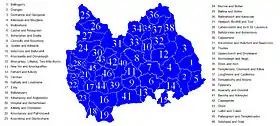Ballinard (civil parish)
Ballinard (Irish: Baile an Aird, meaning 'the high town')[1 1] is a civil parish and townland located in the eastern part of County Limerick, Ireland. The civil parish is part of the barony of Smallcounty. The largest population centre is the village of Herbertstown.[1] The south-eastern part of the parish borders the parish of Kilcullane. Geologically, the parish rests on a substratum of limestone, except in some few places where the basalt rises.
Ballinard
Baile an Aird | |
|---|---|
Civil parish | |
 Ballinard Location in Ireland | |
| Coordinates: 52°31′N 8°27′W | |
| Country | Ireland |
| Province | Munster |
| County | County Limerick |
History
According to Lewis' Topography of Ireland (1837), the parish contained 867 inhabitants and comprised 1366 statute acres. The land was recorded as "in general good". The rectory was impropriate in Edward Deane Freeman. The tithes of the parish amounted to £148, 18 shillings, of which two-thirds were payable to the impropriator[2][3] and the remainder to the vicar. Lewis recorded that there were two pay schools in the parish. The remains of "Ballynard Castle" were to be found on the hill by Ballinard townland itself. This castle was the main seat of a branch of the FitzGerald dynasty that was built in the fifteenth century. The Powel family, who gave their name to a neighbouring townland, had a mansion at Eaglestown.
Ecclesiastical parish
Like all civil parishes, this civil parish is derived from, and co-extensive with a pre-existing Church of Ireland parish of the same name[4] in the diocese of Cashel and Emly. The church mentioned in Lewis's survey is located in the townland of Ballinard. At that time, the church was in ruins.

In the Catholic Church, the civil parish forms part of the ecclesiastical parish of "Herbertstown and Hospital" located at the western edge of the Roman Catholic Archdiocese of Cashel and Emly.[5] There are two church buildings in the parish: the Sacred Heart Church, Herbertstown;[6] St. John The Baptist, Hospital.
Townlands
There are four townlands in the parish:
- Ballinard[1 2] which constitutes 505 acres and contains the ruins of Ballinard Castle, the ruins of the Medieval parish church and the eastern side of the village of Herbertstown.
- Ballyloundash[1 3] which constitutes 316 acres
- Cloghaviller[1 4] which constitutes 545 acres and contains the ruins of Cloghaviller House
- Rootiagh[1 5] which constitutes 274 acres.
References
From "Placenames Database of Ireland". Logainm. Department of Culture, Heritage and the Gaeltacht. Retrieved 24 May 2020.
- "Baile an Aird/Ballinard civil parish". Placenames Database of Ireland (logainm.ie). Government of Ireland - Department of Arts, Heritage and the Gaeltacht and Dublin City University. Retrieved 24 May 2020.
- "Baile an Aird/Ballinard townland". Placenames Database of Ireland (logainm.ie). Government of Ireland - Department of Arts, Heritage and the Gaeltacht and Dublin City University. Retrieved 24 May 2020.
- "Baile Londáis/Ballyloundash townland". Placenames Database of Ireland (logainm.ie). Government of Ireland - Department of Arts, Heritage and the Gaeltacht and Dublin City University. Retrieved 24 May 2020.
- "Cloch an Bhiolair/Cloghaviller townland". Placenames Database of Ireland (logainm.ie). Government of Ireland - Department of Arts, Heritage and the Gaeltacht and Dublin City University. Retrieved 24 May 2020.
- "Ruaiteach/Rootiagh townland". Placenames Database of Ireland (logainm.ie). Government of Ireland - Department of Arts, Heritage and the Gaeltacht and Dublin City University. Retrieved 24 May 2020.
Other:
- "Ballinard civil parish, Limerick". www.johngrenham.com. Retrieved 24 May 2020.
- In ecclesiastical law, appropriation is the perpetual annexation of an ecclesiastical benefice to the use of some spiritual corporation, either aggregate or sole. In the Middle Ages in England the custom grew up of the monasteries reserving to their own use the greater part of the tithes of their appropriated benefices, leaving only a small portion to their vicars in the parishes. On the dissolution of the monasteries the rights to collect "great tithes" were often sold off, along with former monastic lands, to laymen; whose successors, known as "lay impropriators" or "lay rectors," still hold them, the system being known as impropriation.
- One or more of the preceding sentences incorporates text from a publication now in the public domain: Chisholm, Hugh, ed. (1911). "Appropriation". Encyclopædia Britannica. Vol. 2 (11th ed.). Cambridge University Press. p. 229.
- John Caillard Erck, The ecclesiastical register: containing the names of the dignitaries and parochial clergy of Ireland : as also of the parishes and their respective patrons and an account of monies granted for building churches and glebe-houses with ecclesiastical annals annexed to each diocese and appendixes : containing among other things several cases of quare impedit, (1927), page 113
- Catholic Archdiocese of Cashel and Emly - "Hospital and Herbertstown"
- National Inventory of Architectural Heritage - Sacred Heart Roman Catholic Church, BALLINARD, Register number 21903224